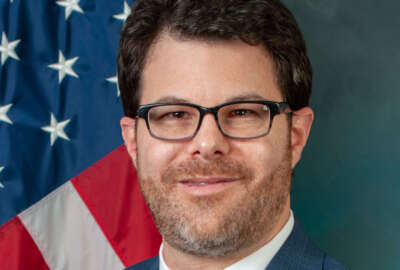
Retiring after nearly 40 years, GAO Public Affairs Specialist Fuller O. ‘Ned’ Griffith has stories to tell…
GAO public affairs officer Ned Griffith retires after 38 years
Best listening experience is on Chrome, Firefox or Safari. Subscribe to Federal Drive’s daily audio interviews on Apple Podcasts or PodcastOne.
We almost never interview public affairs officers on the Federal Drive. In fact, I never have. They’re never the story except now, last Friday, one of the most enduring PAOs and someone we’ve worked with steadily for years, many years, has retired. So I wanted him to tell his story. He’s Fuller Griffith, better known as Ned, from the Government Accountability Office, and he joined the Federal Drive with Tom Temin .
Interview transcript:
Tom Temin: And you’re sort of like a guy who’s backstage all the time for the play coming out in front. So this is something that you’re really not used to yourself, is it?
Ned Griffith: That’s exactly right. I’ve been working sort of behind the scenes for the last 10 or 15 years, you know, scheduling GAO guests for Federal News Network, helping prep them, but I’ve never actually done a radio interview myself.
Tom Temin: Well, it’s good to have you on. It’s never too late, I guess, and maybe begin just by reviewing exactly what the PAO function is. I mean, it’s a job series. You’re in the congressional branch, but there’s certainly a lot of colleagues in the executive branch.
Ned Griffith: Sure. Well, let me tell you, for your viewers who don’t know what GAO is, we’re an independent, nonpartisan agency in the legislative branch, we work for Congress, we issue hundreds of reports and testimony every year on just about everything the federal government is doing anywhere in the world. And then our findings lead to hearings, legislation, program improvements across the federal government. Now the public affairs function in GAO is there to help facilitate the access for the press and the public to GAO’s work. We’re in charge of posting all the audit work as its as its issued, we do a lot of digital and social media, blogs, podcasts, videos, Twitter feeds, you name it. We also handle inquiries directly from the press and the public, whether it’s emails or phone calls. Usually, those are questions about the work itself, points of clarification, or people want to know the status of ongoing work. And we’re happy to respond to those.
Tom Temin: And you mentioned a lot of technological channels that didn’t exist when both of us got started here. So that’s really kind of leavened the work, hasn’t it?
Ned Griffith: That’s changed it a lot. I should point out when I first started in 1989, and in the office of public affairs at GAO, one of my duties was to go several times a day down to the print plant in the basement of the GAO building to pick up the blue books hot off the presses, take them back up to the office of public affairs, and put them in bins labeled with the various media outlets. And they would send messengers, sometimes multiple times a day to pick those up. Obviously, that’s all gone away with, you know, the internet. One of the things I handled when I when I was first hired was I produced a publication called the month in review, it was a hardcopy publication containing summaries of all the reports and testimony GAO issued every month. It went out to 1000s of subscribers, they would read the summaries, and then they would fill out an order form at the back, send it in, and we’d mail back to copies of the reports. Twenty years ago, that became an online publication. And that freed me up then to do other sorts of work. I got into high level writing for the comptroller general and other GAO executives, speeches, presentations, whatnot. And then I also got into the type of work I do with you guys, which is to schedule radio and television interviews. So the technology really freed me up to do other stuff.
Tom Temin: Sure. And just briefly review your career. You’ve been 33 years as a public affairs officer. But that’s not the totality of your federal career.
Ned Griffith: That’s right. I was first hired right out of grad school. I worked for Congressman Steve Bartlett, who was a representative from Dallas, Texas, later became mayor of Dallas. I was a legislative correspondent for him, then was hired at GAO, I worked for a couple of years editing, writing reports and testimony for our general government division. That’s all the non-defense side of things. It’s things like census, postal operations, justice and law enforcement. And then in ’89, I was hired in the office of public affairs, and I’ve been there ever since.
Tom Temin
We’re speaking with Ned Griffith, who recently retired just last week after 33 years as a public affairs officer at the GAO 38 years there in totality. And how long did it take you to stop calling it the General Accounting Office?Ned Griffith: Ah, well, I remember when they decided in 2004, to change the agency name, and it was done to change it from General Accounting Office to Government Accountability Office, because I think there were concerns, you know, members of Congress assumed because we had the word accounting in the name, that’s all we did, or they would go on college campuses and try to do recruiting, and the students would assume you needed to be a CPA to work here. So they changed it the Government Accountability Office in 2004. To better reflect sort of the modern multidisciplinary agency we’d become. What was interesting is, you know, we made a big effort to try to publicize the name change, but even among established journalists, it took years for them to sort of adapt to. They kept calling us the General Accounting Office for quite a while and not anymore, but it was, it was a slow change.
Tom Temin: Well, I catch some members of Congress still calling it that and they still refer to the Veterans Administration to for that matter. That’s been the Department of Veterans Affairs for years too. Fair to say you’ve enjoyed the work?
Ned Griffith: Oh, absolutely. It’s it’s a it’s a terrific agency to work for. It’s full of really bright people, people who are experts in their subject areas. It’s extremely well managed. And the work is incredibly varied. As I said, every day it’s a new report on a new topic. It’s never the same. Then also working with reporters has been a fascinating experience over the years, I’ve sat in on a number of interviews with folks from 60 Minutes, got to see how those folks operate. I’ve gotten calls from any number of national reporters. I remember one time I got a call from Lou Cannon, who was Ronald Reagan’s biographer, who called, he was fact checking a new book, he wanted some information from GAO. So you just never know who you’re going to deal with day to day.
Tom Temin: And GAO people, the the director level people that are responsible for the reports, and that the GAO grants the permission to be interviewed by the media, they’re always willing, sometimes on a moment’s notice to come on. That must have made your job easier relative to so many agencies where all they do is basically say no, and try to seemingly protect the people behind them in the agency.
Ned Griffith: Well, GAO is a remarkably responsive agency. If you call us about something, you will get a response. And one of the wonderful things about working at GAO is we don’t try to act as press spokesman and paraphrase our audit reports. If a reporter calls and wants to talk about this study, we put them in touch with the people who did the work and are experts, and they get the information straight from the horse’s mouth, which is a wonderful thing. And it’s worked out well. As you said, our folks, they go the extra distance to make themselves available often on short notice,
Tom Temin: And you’ve served under I think three comptrollers general. One, David Walker left his term early and Gene Dodaro seems is definitely determined to do his full 10 years. How do those people, as they change at the top, affect the agency and the culture?
Ned Griffith: Well, you know, GAO, it’s an interesting place, GAO has really evolved over its whole 100 year history to meet Congress’ changing needs for information. When we first started out in the 1920s and ’30s, we did voucher auditing, we moved on in the ’40s and ’50s, to more traditional financial audits. And then in the’ 60s we got into performance audits, which deal with whether programs are meeting their objectives. You know, what I can speak to under Gene Dodaro, who has been here since I think the early ’70s is, he’s really made, I think, a concerted effort to help guide GAO into the future. For example, Congress has a growing need for information on on science and tech issues, things like AI and whatnot. And we’ve established a new team dealing with science, technology assessment and analytics issues. It’s an agency that’s looking to the future, and is really nimble in terms of evolving and reinventing itself to meet the needs of Congress and the nation on current and emerging challenges.
Tom Temin: And I confess, we’re always comparing public affairs officers, you know, among reporters and stuff we discuss you guys, do you discuss among other PAO people that you’ve had contact with who’s an SOB and who you can trust and so forth? And what in your opinion makes a good reporter?
Ned Griffith: A good reporter is somebody it’s certainly the reporters, it’s easier to deal with a reporter who is experienced and understands how the government is structured and what GAO does. Sometimes with newer reporters, we have to spend a bit of time trying to bring them up to speed and educate them about what GAO is and how, what it does, you know, what the parameters are and what we can say at any given time, that sort of thing. But most of the reporters I’ve dealt with over the years have been really pretty impressive people, you know, whether it’s the Washington Post or the New York Times or trade publications, it’s been a good experience.
Tom Temin: Good to hear and what what are you going to do in retirement? Do you have like a sled running out of snow? You hit the skids pretty hard.
Ned Griffith: Exactly. After 38 years. I mean, I’ve been working straight since out of grad school, but I think what I’m gonna do is just take some time and think about what I want to do, maybe do some traveling or volunteer work and sort of just get used to not going in every morning to 441 G Street Northwest and you know, making a transition to sort of life after GAO.
Tom Temin: Ned Griffith retired last week after 33 years as a public affairs officer at the GAO, 38 years there all together.
Copyright © 2024 Federal News Network. All rights reserved. This website is not intended for users located within the European Economic Area.
Tom Temin is host of the Federal Drive and has been providing insight on federal technology and management issues for more than 30 years.
Follow @tteminWFED
Related Stories




